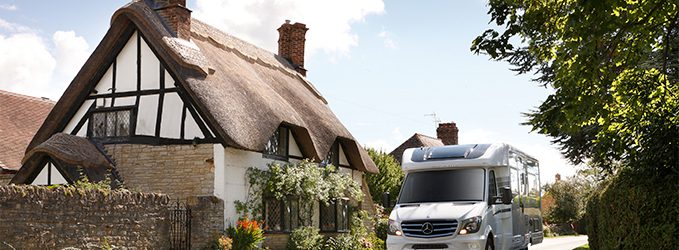Buying a motorhome – it’s a decision you’re unlikely to take lightly. It’s almost certain to mean a significant investment. Plus, the wide range of options and choices you’ll need to make can prove bewildering.
Here at Derby Motorhomes, we can help with a lot of those decisions. Although the following top buying tips are aimed at people considering their first purchase in the field, if you’re a seasoned veteran, then you might also learn something new!
The terms you will encounter
As you begin to think about your possible purchase, it will be helpful to familiarise yourself with a few of the terms you are likely to encounter:
Motorhomes
- these represent the upper end of the type of motor vehicle you may both drive and live in – they are sometimes called motor caravans;
- at the front, there is the driver’s compartment – usually screened off or separated from the living quarters behind;
- all tend to be spacious inside and are very well equipped;
- however, there are still several sub-categories, generally divided by their size and the levels to which they are equipped;
- at the top of the range, for example, are the large, roomy and luxuriously appointed American motorhomes from the iconic Winnebago, some might be so long they incorporate a third axle (a so-called tag axle), others might be coach-built “A” class motorhomes, while still others might be conventional coach-built homes on a standard chassis vehicle;
Camper vans
- at the other end of the scale are more basic motorhomes, which are typically referred to as camper vans;
- camper vans are medium to larger size conversions of mass-produced vans – the VW “combo” being perhaps one of the most widely used and affectionately owned versions.
Campervan versus motorhome
Broadly speaking, campervans are smaller and less well-equipped than full motorhomes.
Campervans are often exceedingly ingenious in their use of relatively limited space, but even so, there is a certain connotation of needing to “rough it” a little – hence the reference to camping in their name.
In our experience, motorhomes are usually favoured by families and more mature couples, who prefer a few luxuries in life. Campervans are typically more appealing to single people or younger couples – but that’s by no means a hard and fast rule!
Choosing your motorhome
In addition to that basic difference between motorhomes and campervans, it is vital to appreciate the vast range of motorhomes themselves – whether new or second-hand.
It is worth giving careful thought to how you intend to use your motorhome – in terms of its ease of driving and manoeuvrability, its size, level of accommodation and fitted equipment, and the number of people it needs to accommodate.
Parking and storing your motorhome when it is not in use may also be a significant consideration – especially given the length and size of some.
If it is to serve as a motor caravan, a home from home and base from which to enjoy your holidays with relatively little driving about in between, for example, you might want to choose a larger model, with higher standards of accommodation.
On the other hand, if it is to be used mainly for touring, with comfortable enough accommodation in which to sleep overnight, a more basic camper van is going to prove more manoeuvrable, cheaper to run, and may provide the ideal solution.
Big U.S. RVs
These Recreational Vehicles are undoubtedly eye-catching and a byword in luxury but remember that you may need to pass an LGV (Light Goods Vehicle) driving test before you are legally able to drive one.
Big versus small
In our experience, people new to this recreational field often assume that the bigger the motorhome, the better it will be for comfort, facilities and so on.
Actually, that’s not necessarily always so. Some motorhomes that are smaller in terms of their floor area might well have far superior levels of equipment to some that are technically larger. A lot depends upon the marque and the designers’ skills.
Further reading: Layout considerations
Think about a driving techniques course
The vast majority of motorhomes are easy to drive and, in many respects, they’re not significantly different from driving an ordinary car. In most cases, subject to your age, aspects of the vehicle’s weight and when your licence was issued, you may be able to drive them on a standard driving licence.
However, they are still slightly larger vehicles and may need a little getting used to in terms of things such as parking, manoeuvring, and reversing. This isn’t exactly rocket science, but there are some modestly-priced courses out there that will help you get to grips with safe driving techniques before you necessarily take your vehicle on the road.
The Caravan and Motorhome Club’s Motorhome Manoeuvring Course, for example, lasts just six hours but covers practically everything you are likely to need to know.
Do your homework – and speak to an expert.
Because of the extensive variation in styles, size, and suitability – not to mention cost – you might find it difficult matching what’s on sale to your particular needs and requirements.
For a much better comparison of both new and used motorhomes, therefore, you might want to visit a specialist motorhome dealer.
On that score, the larger, the better and the more comprehensive the range of motorhomes you can view while tracking down your perfect match.
The larger dealers, such as ourselves, who have established a reputation built on many years’ of experience are likely to offer not only extensive exhibition space but additional facilities, such as online chats and listings, to help you narrow down your search.
There are lots of great things to learn about motorhomes, and all of them will potentially have some influence on your eventual decision as to make and model etc.
Most of those lessons are positive ones, relating to different types of benefits that come with different versions of motorhomes. Still, it’s also important to be aware of certain things to watch out for too – and that is where our expertise and experience might come in.
Think, too, about what is important to you. It can be all too easy to go along to a couple of showrooms and be swayed by motorhome characteristics that might subsequently prove to be mostly irrelevant in your particular situation.
For example, the internal upholstery might be especially attractive in one model, but that will count for nothing if the driver and passenger seats prove to be uncomfortable on long journeys.
Before you go to a showroom, think about things such as:
- how regularly you are going to use the vehicle on long-distance journeys. That might tell you a lot about your requirements for driving position comfort and things such as engine power and tolerable noise levels etc.;
- just how many people it will need to accommodate, on average, over a typical year. Having multiple extra berths might be a lot less relevant to you than having a larger bathroom area (or vice versa); etc.
Of course, many other things should be on a list of this nature. The point is, have as good an idea as possible about your priorities before you start looking at individual motorhomes.
Look at your budget
Not only do motorhomes come in all shapes and sizes, but there are also just as many variations in the price – and that means giving careful thought to your budget.
It’s also fair to say that new motorhomes or those that are relatively modern, even if pre-owned and pre-loved, aren’t likely to be describable as “cheap”. Having said that, keep in mind the good news – typically they hold their value well in terms of future re-sales (unlike most cars).
Being clear how much you are willing/able to spend in advance is important in terms of influencing your viewing and researching strategy.
At the same time, however, try to avoid becoming fixated on price. True, there’s little point in evaluating motorhomes that you can’t afford. Even so, going around looking for the cheapest possible vehicle you can find isn’t always the most advisable tactic from a finance point of view.
For example, some motorhomes may depreciate rather more quickly than others. It can also be deeply frustrating to find after purchase that you may have saved £2,000 by selecting a cheaper model, but the result is a motorhome that just isn’t meeting your requirements.
While affordability and budget are significant factors, try to avoid thinking about the price before you are clear on your “must-have” requirements. Compromise is always a good thing, but it can be taken too far and leave you full of regret when using your new motorhome. That £2,000 might not seem such a big deal in those circumstances.
Don’t forget to take in to account other costs such as motorhome storage and motorhome insurance.
Clear your finances in advance
Nothing is more frustrating than getting excited about a particular motorhome, only to find that you can’t secure the financing subsequently. A variation on the same is when the decision on the money takes so long to come through that the vehicle is sold elsewhere in the meantime.
Make sure, therefore, that you have thought about your budget and agreed it in advance, in principle at least, with an individual funding provider. Significant numbers of motorhome dealerships might be able to assist you in your search for funding if required.
You’ll be pleased to know, therefore, that our finance service here at Derby Motorhomes offers a wide range of products designed to help fund your purchase – and, if your motorhome finance application is accepted, clearing those funds typically takes little time at all.
New or second-hand?
There is probably little we can add about the attraction of buying new rather than second-hand.
There’s probably nothing to equal the pleasure and satisfaction of knowing that you are the first ever to drive and sleep in a brand-new motorhome. On the other hand, assuming all else is equal, such as marque and model, a used motorhome is likely to cost less than one that’s brand new. And the depreciation will typically be less.
It’s always advisable to source a used motorhome from a reputable and highly experienced dealer. Purchasing from a street-corner generalist type car dealer might be risky, as they may lack the experience to offer you full advice.
Further reading: Auto-sleeper part exchange options.
A note of caution if you choose to buy privately
Purchasing privately from an owner is, of course, also an option. Apply all the usual review and research criteria. Do keep in mind that your legal rights of redress should something go wrong post-purchase, may be far more limited than might be the case if purchasing from a company.
Motorhomes typically hold their value far more than the average motor car. That means even if they are pre-used, they’re likely to cost you a substantial sum of money.
As a result, there are crooks out there who will seek to take advantage of unwary buyers typically through a combination of identity theft and selling motorhomes that aren’t theirs to sell.
This is a big subject, and it can’t be adequately covered in a brief article. You should, therefore, research it online and take all steps necessary to protect your interests when buying from a private individual.
Provided you are aware of the possible pitfalls and scams and continue to exercise a buyer’s caution, you might be able to strike an attractive deal on a used motorhome bought privately. Make sure you doubly protect yourself from possible fraud by:
- making identity checks, to be sure you know exactly who you are dealing with and that the address they are giving you is, in fact, real;
- verifying ownership of the vehicle – to be sure that they own the vehicle they are selling;
- conducting outstanding finance checks, to be sure that you are not inheriting any potential debts with the vehicle; and
- making any cash transfer with as much security protection as you can muster.
Summary
Questions about the size of the motorhome that best suits you, makes and models, use of your recreational vehicle, finance options, and whether to buy new or used, from a dealer or private sale – you’re likely to be faced with many decisions if you’re looking to buy a motorhome.
We have lots of other useful motorhome buying tips plus general advice and guidance for those who are purchasing a motorhome.
Why not contact us for an initial friendly and entirely non-committal discussion? We’d be delighted to help!
Further reading: Motorhome buying guide.




